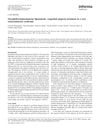18 citations,
June 2010 in “Cell Stress and Chaperones” Heat treatment increases hair loss in certain mice.
 43 citations,
January 2013 in “Indian Journal of Dermatology, Venereology and Leprology”
43 citations,
January 2013 in “Indian Journal of Dermatology, Venereology and Leprology” The article concludes that advancements in hair cosmetics require dermatologists to stay informed about products and their potential risks, including allergies and higher risks for hairdressers.
 37 citations,
April 2013 in “Plastic and Reconstructive Surgery”
37 citations,
April 2013 in “Plastic and Reconstructive Surgery” Genetic and environmental factors, like smoking and exercise, affect male hair loss.
 February 2024 in “International Journal For Multidisciplinary Research”
February 2024 in “International Journal For Multidisciplinary Research” Nanostructured lipid carriers are effective for treating hyperpigmentation in women aged 30-40.
16 citations,
January 2019 in “Pharmaceutical biology” Lespedeza cuneata extract may help treat enlarged prostate.
 5 citations,
October 2022 in “Cosmetics”
5 citations,
October 2022 in “Cosmetics” Cell-based models help test if cosmetic ingredients really work for hair growth and skin health.

Solanum nigrum may help treat hair loss.
 9 citations,
May 2013 in “JAMA Dermatology”
9 citations,
May 2013 in “JAMA Dermatology” Sunlight exposure improved a patient's skin condition, and there may be a link between a certain disease and skin growths; a leukemia treatment caused changes in hair color and growth.
 June 2023 in “International journal of research in ayurveda and pharmacy”
June 2023 in “International journal of research in ayurveda and pharmacy” Dhatryadi Rasayana, an Ayurvedic herbal mix, may be a safe and effective way to prevent premature hair greying.
 5 citations,
December 2005 in “Clinical Techniques in Equine Practice”
5 citations,
December 2005 in “Clinical Techniques in Equine Practice” Skin and hair changes in horses can indicate serious diseases, and recognizing these signs is important for treatment and management.
 January 2017 in “Archives of clinical and biomedical research”
January 2017 in “Archives of clinical and biomedical research” Enhancing melanin's energy generation may help treat alopecia areata.
 42 citations,
January 2021 in “Journal of Clinical Medicine”
42 citations,
January 2021 in “Journal of Clinical Medicine” Microneedle arrays with nanotechnology show promise for painless drug delivery through the skin but need more research on safety and effectiveness.
 489 citations,
November 2021 in “Signal Transduction and Targeted Therapy”
489 citations,
November 2021 in “Signal Transduction and Targeted Therapy” The JAK/STAT pathway is important in cell processes and disease, and JAK inhibitors are promising for treating related conditions.
 3 citations,
January 2011 in “Clinics in Dermatology”
3 citations,
January 2011 in “Clinics in Dermatology” The paper concludes that elderly in India face unique skin challenges and need better dermatological care and awareness.
 June 2023 in “Plastic and Reconstructive Surgery – Global Open”
June 2023 in “Plastic and Reconstructive Surgery – Global Open” Exosomes may improve skin, scars, hair growth, and fat grafts in plastic surgery, but more research is needed.
 May 2017 in “InTech eBooks”
May 2017 in “InTech eBooks” Some hair loss disorders cause permanent loss due to scarring, and treatments like steroids don't always work well.
 15 citations,
June 2020 in “Experimental Dermatology”
15 citations,
June 2020 in “Experimental Dermatology” Hormones and genes affect hair growth and male baldness.
 179 citations,
October 2018 in “American Journal of Clinical Dermatology”
179 citations,
October 2018 in “American Journal of Clinical Dermatology” Cancer treatments targeting specific cells and the immune system can cause skin, mouth, hair, and nail problems, affecting patients' quality of life and treatment adherence.
 15 citations,
February 2017 in “Nursing Clinics of North America”
15 citations,
February 2017 in “Nursing Clinics of North America” Targeted cancer therapies can cause skin side effects, which should be treated early to help patients' quality of life and treatment adherence.
 191 citations,
May 2018 in “British journal of dermatology/British journal of dermatology, Supplement”
191 citations,
May 2018 in “British journal of dermatology/British journal of dermatology, Supplement” Alopecia areata is likely an autoimmune disease with unclear triggers, involving various immune cells and molecules, and currently has no cure.
 1 citations,
October 2022 in “Current Dermatology Reports”
1 citations,
October 2022 in “Current Dermatology Reports” COVID-19 and vaccines cause various skin reactions and highlight the need for dermatologists in managing these issues and addressing vaccine distribution disparities.
 1 citations,
June 2023 in “Cells”
1 citations,
June 2023 in “Cells” Exosomes could be a promising way to help repair skin and treat skin disorders.
 January 2018 in “Springer eBooks”
January 2018 in “Springer eBooks” Athletes need effective management of skin disorders for their performance and well-being.
514 citations,
February 2011 in “International journal of women's health” Different treatments for PCOS focus on the specific symptoms, with weight loss and lifestyle changes being important.
 January 1998 in “Lasers in Surgery and Medicine”
January 1998 in “Lasers in Surgery and Medicine” Lasers are effective and safe for various medical treatments, including cancer, wound healing, and skin conditions.
 September 2015 in “Actas Dermo-Sifiliográficas”
September 2015 in “Actas Dermo-Sifiliográficas” People with advanced chronic kidney disease often have skin problems, which can be treated with various medications and procedures to improve their quality of life.
142 citations,
March 2019 in “Molecules/Molecules online/Molecules annual” Cannabinoids may help treat various skin conditions.
 55 citations,
June 2013 in “Dermatologic Surgery”
55 citations,
June 2013 in “Dermatologic Surgery” Ablative fractional resurfacing could improve how well topical drugs penetrate the skin, but more research is needed to fine-tune the method.
 4 citations,
January 2023 in “Frontiers in Medicine”
4 citations,
January 2023 in “Frontiers in Medicine” Zinc is important for skin health, and supplements can help treat various skin and hair disorders, but more research is needed for conditions like psoriasis and vitiligo.
 4 citations,
September 2013 in “Journal of Plastic Surgery and Hand Surgery”
4 citations,
September 2013 in “Journal of Plastic Surgery and Hand Surgery” A girl with a rare syndrome had successful hair loss treatment with no relapse after 4 years.

























